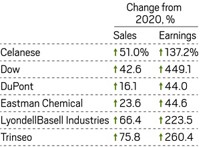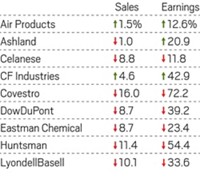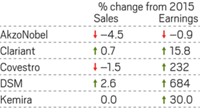Advertisement
Grab your lab coat. Let's get started
Welcome!
Welcome!
Create an account below to get 6 C&EN articles per month, receive newsletters and more - all free.
It seems this is your first time logging in online. Please enter the following information to continue.
As an ACS member you automatically get access to this site. All we need is few more details to create your reading experience.
Not you? Sign in with a different account.
Not you? Sign in with a different account.
ERROR 1
ERROR 1
ERROR 2
ERROR 2
ERROR 2
ERROR 2
ERROR 2
Password and Confirm password must match.
If you have an ACS member number, please enter it here so we can link this account to your membership. (optional)
ERROR 2
ACS values your privacy. By submitting your information, you are gaining access to C&EN and subscribing to our weekly newsletter. We use the information you provide to make your reading experience better, and we will never sell your data to third party members.
Business
Chemical Firms End Year On A Strong Note
Earnings: Managers take credit for earnings increases in the fourth quarter
by Alexander H. Tullo
February 2, 2015
| A version of this story appeared in
Volume 93, Issue 5

Chemical companies found ways to boost earnings in the fourth quarter even though sales generally slumped. Executives said their strategies are helping them overcome headwinds such as weakening foreign currencies and lower oil prices.
Dow Chemical’s fourth-quarter net earnings increased 25% versus the same period in 2013, hitting $992 million and beating analyst expectations. This despite declining oil prices, which are putting downward pressure on chemical prices.
Dow CEO Andrew N. Liveris sees the quarter’s results as vindication of his strategy to integrate large-scale petrochemical production with specialized derivatives. “We are creating short-, medium-, and long-term value, in line with the strategic actions we have taken,” he told analysts in a conference call. “We are proving why it is best to own the full value chain.”
Liveris has been criticized by Daniel S. Loeb, a large shareholder and activist investor who wants Dow to separate into two companies along commodity-specialty lines, disrupting the integration that Liveris cherishes.
DuPont also posted upbeat results. The company’s quarterly sales were down by about 4.8% versus the same quarter in 2013. Yet adjusted net income surged 31.9%.
In a conference call with analysts, DuPont CEO Ellen J. Kullman gave DuPont’s managers credit for the gains. “Our fourth-quarter results reflect our continued focus on execution, with volume and margin improvements in almost every segment,” she said.
The company is also increasing its compensation to shareholders. DuPont disclosed that when it completes the spin-off of Chemours, its performance chemicals business, it will get a special dividend from Chemours of $4 billion. DuPont will then distribute this money, tax-free, to DuPont shareholders via a share repurchase.
In a note to clients, UBS stock analyst John Roberts noted that the dividend exceeds his original estimate by $1.7 billion.
DuPont also raised its annual cost reduction targets, previously $1 billion, by $300 million. The company expects to reach this goal by 2017.
DuPont is under fire from Nelson Peltz, the activist investor who controls a 2.7% stake in the firm and who is trying to install four handpicked directors. DuPont executives wouldn’t take questions about Peltz nor his hedge fund, Trian Partners, during the call.
At Ashland, strategy was on the mind of William A. Wulfsohn, the firm’s new CEO, who was reporting earnings for the first time. Ashland boosted profits 15.9% during the quarter.
Following a decade of transformative acquisitions, such as the purchase of International Specialty Products, deal-making won’t be a big part of Ashland’s strategy going forward, Wulfsohn said. “It’s a good time for us to instead focus on realizing the profit and cash generation potential from these past investments,” he told analysts.
Weakening foreign currencies were a frequent complaint from chemical companies reporting on the quarter. Companies are penalized when they report foreign earnings to investors in strengthening dollars. DuPont, which generates only 37% of its sales in the U.S., says weakening foreign money was responsible for nearly half of its sales decline.
And lower oil prices might prove disruptive for some companies. For instance, on Celanese’s conference call, CEO Mark C. Rohr called into question plans to build a methanol plant in Bishop, Texas. Lower oil prices are putting pressure on methanol prices in Asia, a key export market.
“There is still a positive return on it,” Rohr said of the methanol plant. “But not as good as it was.” As the year progresses, Rohr added, Celanese will weigh the future of the methanol plant against the longevity of the oil price decline.





Join the conversation
Contact the reporter
Submit a Letter to the Editor for publication
Engage with us on Twitter